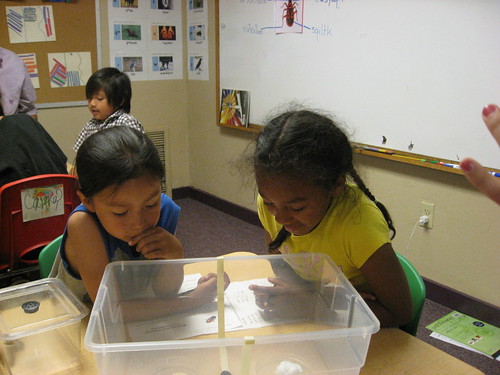
Future scientists conduct their first experiment: 1st grade students at the Salish School of Spokane hypothesize how different food choices and chemical scents will affect insect behavior and then record and discuss the actual results. Photo courtesy of ARS.
This post is part of the Science Tuesday feature series on the USDA blog. Check back each week as we showcase stories and news from the USDA’s rich science and research portfolio.
2014 marks the eighth year of “Pumping Up the Math and Science Pipeline: Grade School to College,” an innovative science, technology, engineering and math (STEM) educational outreach program developed and administered by USDA Agricultural Research Service (ARS) employees David Weller and Kathleen Parker in cooperation with Washington State University-Pullman (WSU) and other partners.
“The goal of the program is enhance the flow of students from underserved and rural communities into STEM professions. We do this by engaging students of all ages in one-on-one and hands-on STEM education and other activities,” explains Weller, who leads the ARS Root Diseases and Biological Control Research Unit in Pullman.
One day each month, Pipeline participants from ARS, WSU, or other partner organizations teach STEM-related topics to students in the fifth through eighth grades at at Nespelem School or Paschal Sherman Indian School on the Reservation of the Colville Confederated Tribes, about 150 miles northwest of Pullman.
Parker, a program assistant at Pullman who orchestrates the trips, says the visits include hands-on experiments related to soil erosion, chemistry, microbiology, plant science and many other topics.
Personnel from other ARS laboratories in Pullman and WSU also participate. For example, Ted Kisha, a plant geneticist with the ARS Western Regional Plant Introduction Station in Pullman, teaches students how to extract DNA from banana cells using household items.
Other Pipeline program activities include a summer science camp, high school research internship, mentoring, and career counseling for undergraduate students. Community outreach is another facet.
Fostering greater student interest in STEM professions among Native Americans and other underrepresented groups isn’t the only Pipeline goal, says Parker. Another is instilling a sense of confidence, pride, and teamwork in the students.
Weller and Parker are pleased to report that the program’s first “crop” of research interns from the class of 2007 have gone on to earn their college degrees and then enrolled in graduate programs. Other interns are continuing their work in ARS labs in Pullman.
“Our emphasis is on empowering the students to say, ‘Hey, I can do this,’” says Weller. But scientists who participate in the project also benefit. As a scientist, he adds, “It really enhances your research and improves your ability to communicate the importance of your work.
No comments:
Post a Comment